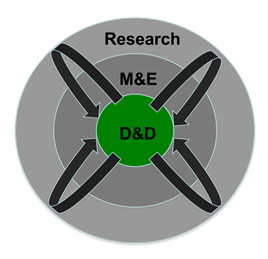N2Africa will build sustainable, long-term partnerships to enable African smallholder farmers to benefit from symbiotic N2-fixation by grain legumes through effective production technologies including inoculants and fertilizers. The legacy will be strong national expertise in grain legume production and N2-fixation research and development. The capacity built will sustain the pipeline and delivery of continuous improvement in legume production technologies tailored to local settings. Activities will focus on cowpea, groundnut and soybean in Ghana and Nigeria, on common bean, cowpea, groundnut and soybean in Tanzania and Uganda, and on common bean, soybean, chickpea and faba bean in Ethiopia. Within five years, building on local expertise, legume production will be enhanced in the major legume growing areas of each partner country, providing opportunities for the poor and addressing gender disparities. The food and nutritional security of the poor will be enhanced and new value chains will be established. In Phase II, N2Africa will reach more than 550,000 farmers with a return on investment of US$3.5 for each US$ invested.
How we achieve our vision of success
With our work we aim to increase the benefits from legume nitrogen fixation by grain legumes for smallholder farmers in sub-Saharan Africa. The performance of a grain legume and the associated amount of N2 fixed depend on the interaction between the genotype of the legume, the genotype of the rhizobia, the environment and the management of the crop and field; (GL ×GR)×E×M in short. We select and test good potential legume genotypes, do research to identify the best matching rhizobia strains and try to optimize the management of legume fields. Testing of legume technologies by large numbers of farmers allows us to tailor and adapt legume technologies to specific sites and specific farmers, and to translate ‘best fit technologies’ at the field-scale into a set of best-fit principles and options for each project area.
Because the adoption of new technologies goes hand in hand with input and output markets, N2Africa engages with the private sector to ensure a stable supply of agricultural inputs such as seed, fertilizer and inoculant, and by linking farmers to output markets, amongst others through adding value to legume produce. By working through national systems, by training of all key stakeholders from farmers to traders, development workers in extension and NGOs, and by educating MSc and PhD candidates in each country, we build the capacity that can in the future sustain an independent and continuous improvement of legume production technologies.
Direct beneficiaries of N2Africa are the farming households with increased benefits from BNF, such as greater food and nutrition security or increased incomes. Other direct beneficiaries of the project are agro-dealers supplying agro-inputs, seed producers engaged in the legume seed sector, staff from development agencies who benefit from hands-on capacity building activities, national system scientists who are exposed to new ways of doing science through the ‘development-to-research’ framework, and the private sector engaged in the production and promotion of inoculants and legume-specific fertilizer.
 |
How we learnN2Africa is a development to research project, with the core of the work being Delivery & Dissemination (D&D). Through our Monitoring & Evaluation framework (M&E) we collect data from the dissemination trials and demonstration plots, from the farm households, from processors and traders, from input suppliers and from partners. All these data feed into research and the research outcomes flow back into the D&D again. |
If you want to read more about what N2Africa does, continue to our objectives.
